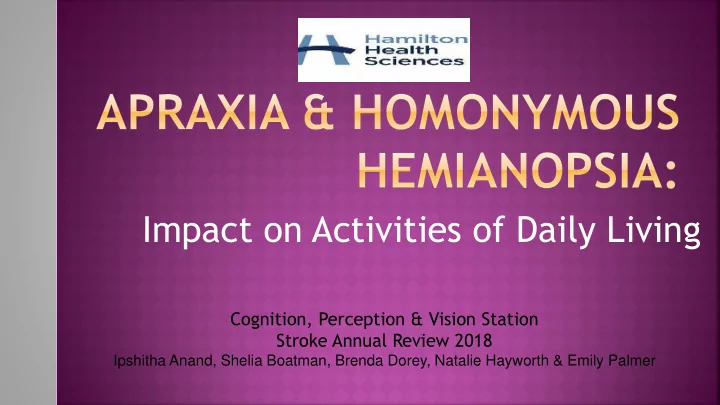

Impact on Activities of Daily Living Cognition, Perception & Vision Station Stroke Annual Review 2018 Ipshitha Anand, Shelia Boatman, Brenda Dorey, Natalie Hayworth & Emily Palmer
● Review the case scenario ● Apraxia Definition and presentation ● Homonymous hemianopsia Definition and presentation ● What can we do? ● Take Home Messages ● Questions
● Manuel is a 56 year old man ● Manuel was assessed by OT and he presents with ideational apraxia when completing bathing, showering and grooming ● He also has difficulties with fully scanning his environment due to right homonymous hemianopia
● Inability to perform purposeful movements ● Deficit with accessing the motor plans ● Often presents in combination with aphasia ● It is most beneficial to patients to assess and practice tasks in context
● Breakdown of knowledge of what is to be done to perform the task, including lack of knowledge regarding object use and errors in sequencing
● Loss of the movement memory pattern so that movement cannot be produced ● Difficulty with how to perform a task ● Movements may be produced spontaneously with difficulty performing same movement when asked
Ideational Apraxia Ideomotor Apraxia • Tool misuse (i.e. using a • Clumsiness toothbrush to brush hair) • Awkward grasp on objects • Sequencing errors (i.e. putting • Difficulty with transfers on shoes and then socks) • Perseveration (i.e. washing hair repetitively without moving on to the rest of the body) • Performance latency (i.e. standing in shower without initiating washing)
● Routine ● Use of pictures ● Cues ● Consider environment set-up ● Keep tasks in context ● Provide education for patients and families ● Talk with the occupational therapist about patient specific strategies
● Also known as a field cut ● Loss of half of the visual field in both eyes ● Injury location will determine how much vision is lost and location of vision loss
● Difficulty or inability to read and/or write ● Decreased safety, independence and confidence with mobility ● Increased feelings of anxiety, especially in busy settings ● Misidentification of details on the affected side ● Slow visual scanning (Warren, M (2010): Evaluation and Intervention for Visual Processing Deficits in Adult Acquired Brain Injury Part I: Visabilities Rehab Services Inc.)
● Encourage patient to scan their environment ● Utilize visual anchor ● Environmental set-up ● Give patients extra time ● Educate family members and visitors ● Talk with the occupational therapist about patient specific strategies
● Both apraxia and visual field cuts can significantly impact an individuals ability to manage basic ADLs ● There are things we can do to help!
● Gillen G (2008): Cognitive and Perceptual Rehabilitation: Optimizing Function. St. Louis: Elsevier/Mosby ● Warren, M (2010): Evaluation and Intervention for Visual Processing Deficits in Adult Acquired Brain Injury Part I: Visabilities Rehab Services Inc.) ● Zoltan, B (1996): Vision, Perception and Cognition: A manual for the evaluation and treatment of the neurologically impaired adult (third edition). Thorofare, New Jersey: SLACK Incorporated
Recommend
More recommend